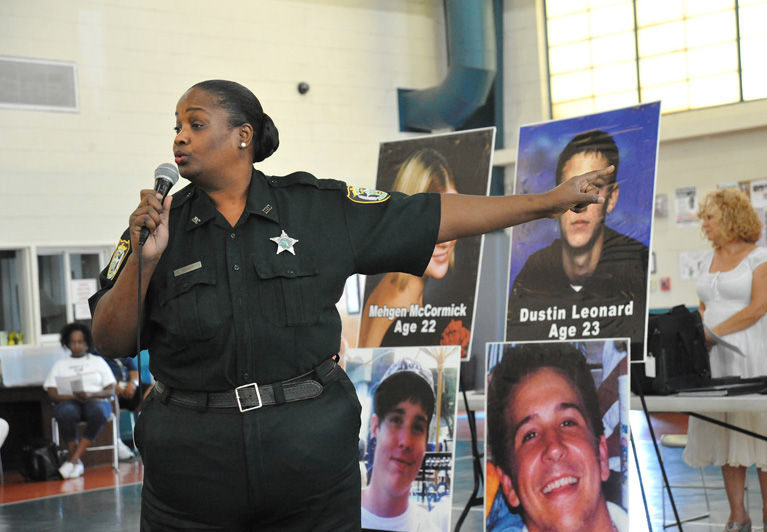
More than 70 residents of the Gifford community, mostly “tweens” and teens, gathered last Saturday to attend a Youth Taking Charge summit in the gymnasium of the Gifford Youth Achievement Center.
Sponsored by the Indian River County Department of Health, Walmart, Walgreen’s, the Indian River County Sheriff’s Office and Oculina Bank, the three-hour program included Jumpin’ Joe Jenkins, the popular disc jockey on WFLM-FM 104.7.
As the master of ceremonies, Jenkins kept things moving at an inspiring pace. He and several other members of the Gifford Community told the audience with honesty about their own experiences growing up, hoping to decrease substance abuse and HIV rates in the community.
“I want our youth to have a great life,” said John May a community leader and one of those who shared his experiences and his gratitude that he lived through them. “I have been there, done that, and I want kids to understand why they shouldn’t do it. Drugs don’t solve the problem. They only create problems.”
Sheriff’s Department Deputy Rod Smith, a resource officer at the Alternative Center for Education, grew up in Gifford and has built a special trust with the young people in the community because they know him to be honest and straightforward.
“All the kids know that I am approachable,” he said. “I was born and raised in poverty. There was a lot of pressure for me to be in a gang and sell drugs, but it just did not appeal to me. Also, my uncle was in law enforcement, and I never wanted to get into trouble, because of him.”
Sheriff Deryl Loar spoke to the audience about how to respond when approached by law enforcement, and Deputy Ella Goodman explained the reality of what happens when someone goes to jail.
Several local substance abuse organizations also participated, including SAFIR (Substance Abuse Free Indian River County), NOPE (Narcotics Overdose Prevention and Education). Still others spoke about bullying and cyber-bullying, gun safety, teen pregnancy, and dating/domestic violence.
David Cavell, SAFIR coalition coordinator, said that in Indian River County, 70 percent of teenagers do not have substance abuse problems. “We should celebrate that statistic. We are working to help the other 30 percent,” said Cavell, who also spoke about the effect of substance abuse on young brains.
“The pre-frontal cortex in young brains does not develop until a person is in his or her early to mid-20s,” he explained. “Addictive substances are dangerous to young people, because they hinder the development of the pre-frontal cortex. One of our missions is to try to delay first use for as long as possible.”
Jenkins surveyed the room as the hungry audience took a break to devour a lunch of hot dogs and chips.
“We need things like this,” said Jenkins. “When you communicate, you educate. Education is the new civil rights. The biggest gift to our community is passing down the spirit of moving on, no matter how many mistakes someone makes. It is all about resiliency.”



